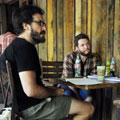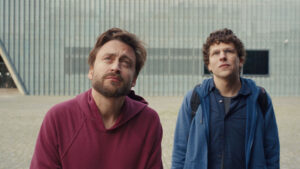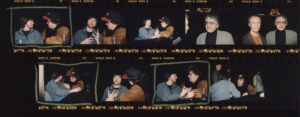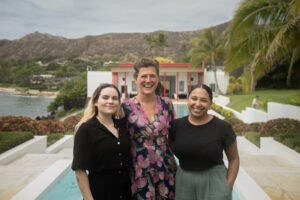Charles Spano, Clay Jeter, and Creative Advisor Jessie Nelson. Photo by Fred Hayes.
Clay Jeter and Charles Spano, Screnwriters Lab Fellows
Clay Jeter and Charles Spano recently attended the Sundance Institute Screenwriters Lab in the mountains near Park City, Utah, with their project IO, a screenplay about a teenage girl surviving as one of the last humans on an abandoned planet Earth. Below is Part 1 in a two-part series chronicling their experiences. Click here for Part 2.
DAY ONE
CHARLES: Thirty-four minutes before my flight takes off from JFK, I am standing at the Delta counter and they have given away my seat. I text Clay, “Not going to make my plane.” He texts back, “About to leave for LAX. My flight takes off in 1 hour 20 minutes.” Oh no. We can’t be those guys.
CLAY: I’m in LA rushing to get packed when I get the text from Charles. My first thought is not – “This isn’t a good impression for us. I better not miss mine!” – or – “Will he still have a ride from the airport?” Instead, my first thought is – “Oh shit, I’m on my own. They’ll recognize me as a fraud immediately, and realize they’ve made a mistake by inviting us.” I’m terrified for selfish and insecure reasons. This is right about the time that I realize I’m in serious danger of missing my flight too… But I make it, just barely.
CHARLES: I, on the other hand was more concerned about the logistics of getting to Sundance from the airport. It never occurred to me that anyone would think we were frauds! This is one of the reasons why it is good to have a writing partner to share the workload, we get to divide up the worrying too.
CLAY: Charles doesn’t make it in time for orientation (nightmare coming true). A big circle of chairs. I’m one of the first to take a seat. Pretty soon, Walter Bernstein, a Creative Advisor, takes the seat at my right. As the room fills and options become limited, Mari Heller, an incumbent Fellow, takes the seat at my left. I’m pretty much directly across from Michelle Satter (Sundance Feature Film Labs Mastermind in Residence), which means I’m the halfway point as we go around the circle introducing ourselves and our projects. I’m trying to be a good listener, but at this point my main goal is to avoid making a fool of myself. I think it goes pretty well. I even introduce Charles. A few of the Advisors aren’t scheduled to arrive until tomorrow, but my partner is the only person who missed his flight.
By 11 p.m., we’re back at the house. I stay up on the deck talking for a while with our housemates, Eric and Sam. But it’s an early morning tomorrow and a full day, so I’m going to have to crash before Charles arrives.
CHARLES: I arrive at 1 a.m. ready to go. Everyone is already asleep.
DAY TWO
CLAY: I keep waking up throughout the night. Short of breath, headache, sore throat. But I’m not getting a cold. We’re at 6,500 ft, and I’ve been living at sea level for the last 10 years. While I’m waiting for Charles to get ready, a gang of wild turkeys slowly make their way across our front yard.
CHARLES: On the walk down the mountain to Sundance base camp, I hesitantly make a bold, if tentative, suggestion to Clay – “What do you think about cutting out all of the flashbacks and dream sequences in our script?” We haven’t even had an Advisor meeting yet and already we are tearing our work apart.
At breakfast, everyone is not only aware that I missed my flight, they are all genuinely concerned for my well-being. I look around the room at Fellows, Advisors, and Sundance Staff: this is a Margaret Mead-worthy, small-band-of-committed-idealists-setting-out-to-change-the-world, if I’ve ever seen one. Maybe it’s the setting, but I feel like we’ve stepped into a photo from the ‘70s with Redford and Newman; or maybe one of those pictures of Francis Ford Coppola and team on the roof of the American Zoetrope building.
CLAY: At 9 a.m., all Fellows watch a documentary about Waldo Salt. Most relatable bit – “If you give Waldo a deadline, he can’t write, if you don’t give him a deadline, he won’t write.”
Before our first Advisor meeting, we have a short break. Charles picks up a road bike he reserved ahead of time. I grab a map of the surrounding area. It’s so beautiful up here, and I didn’t bring my muddy hiking boots with me for nothing.
CHARLES: Doug Wright (Pulitzer Prize-winning playwright and all-around sweet guy) suggests that we cut the flashbacks and dream sequences from our script. Done. (Nice to be on the same wavelength with the criticism). Doug comes from theater and knows how to be gentle with writer egos. He goes on to compare his writing process with ours. It’s not until two hours later that the significance of this sinks in. It is both humbling and uplifting. We’ll make a sci-fi fan out of you yet, Doug!
CLAY: By the end of this meeting, we’re already wanting to dive into the screenplay and get to work! But there are still five more Advisor meetings to go. Our second session is with Walter Bernstein, who turns 93 next month. He was blacklisted in the ‘50s, wrote Fail-Safe in the ‘60s, and was nominated for an Oscar in the ‘70s. He’s a no-nonsense guy, and he wants to jump right into it, starting with his issues involving our protagonist. Though they approached the meetings in totally different ways, Doug and Walter both found their ways to identify some of the same problems.
More hanging out on the deck that night with the housemates. It was a good day.
DAY THREE
CLAY: Slept through the night this time. Am I adjusting to the altitude or just starting to relax? The turkeys are back, and there are more of them this time. I take it as a good omen. Charles is still out on his morning ride.
I meet Herb, the projectionist. We’re screening my feature, JESS + MOSS, at 9 a.m. for the other Fellows. Despite the early hour, all of the Fellows show up, except Charles. But he’s seen it before and he’s probably enjoying his ride. (BTW, I’ve seen Jess and Moss a bunch of times–Charles)
After the first minute or two, I duck out. It’s excruciating to watch the movie with other people—an utterly helpless feeling. While I wait, I busy myself reading the Advisors’ and Fellows’ bios in the Lab book. Mine reads like I’m trying too hard. I really need to change that thing.
It’s time for our first meeting and still no Charles. I’m finally getting a little worried. Of course, this is the guy who missed his flight, so maybe he’s just running late. Since my cell phone doesn’t get service on the mountain, I use the landline from the yurt that is serving as the staff office to call him. He’s back at the house and asks if I received his texts and voice messages. Nope. Apparently, his morning ride turned into a “death march” in Charles’ words. He’s cleaning up some road rash and will be down shortly. Says we should start without him. We’re not too far into things when Charles shows up.
CHARLES: I fly in from my death march, complete with blood and bruises, ready to dig in on our script again. Susan Shilliday (Legends Of The Fall) likes sci-fi. This is good. She gets where we are coming from and calls us out on our clichés. Plus, she explains things to us via Star Wars, which is a language we understand.
CLAY: Being a big sci-fi fan, Susan has some issues with logistics, backstory and the science of our world. Admittedly, neither Charles, myself, nor our other writing partner, Will Basanta, are sci-fi gurus. We’re out of our element here, and it’s obvious. We were hoping to make an indie drama in a sci-fi setting that could be appreciated by non-sci-fi people. But it looks like we’re in danger of losing real sci-fi fans in the process. Hopefully, we can figure out a way to engage both. Our second meeting of the day is with Michael Arndt.
CHARLES: Have you seen Toy Story 3??? This is maybe the best structured…uh… movie. Period. Michael Arndt knows structure better than anyone. And he is a Bresson, Jarmusch, Wong Kar-Wai guy. And he can prove that Shakespeare knew structure inside out. Michael clarifies the motivations, themes, and dramatic turns in our script and Clay and I become devotees of the Arndt method. Our script is more Stalker than WALL-E, but art movie or blockbuster, Michael has a master road map.
CLAY: Michael has had two features produced. Both nominated for Oscars. Little Miss Sunshine won. We talk Hamlet, Star Wars, The Graduate, and even Tarkovsky. Even if we don’t want our film to have Pixar-tight structure, it’s definitely interesting to see what that version of our movie would look like and where we’re hitting the beats already. He recommends Paul Schrader’s Transcendental Style in Film as an alternative approach to structure. Michael is one of the most acclaimed and sought-after writers on the mountain and simultaneously one of the most humble, generous, and down-to-earth.
That evening, Jessie Nelson leads a series of screenings and discussions, featuring works by most of the Advisors. Wesley Strick talks about my favorite scene from the Scorsese directed remake of Cape Fear (Juliette Lewis and Robert DeNiro in the school theater). Scott Burns chooses a scene from Contagion that he wasn’t happy with and discusses why. It’s so interesting hearing the Advisors ask each other questions about their different approaches to writing. I wish this would have taken place on the first night. It really makes all of the Advisors seem approachable.




